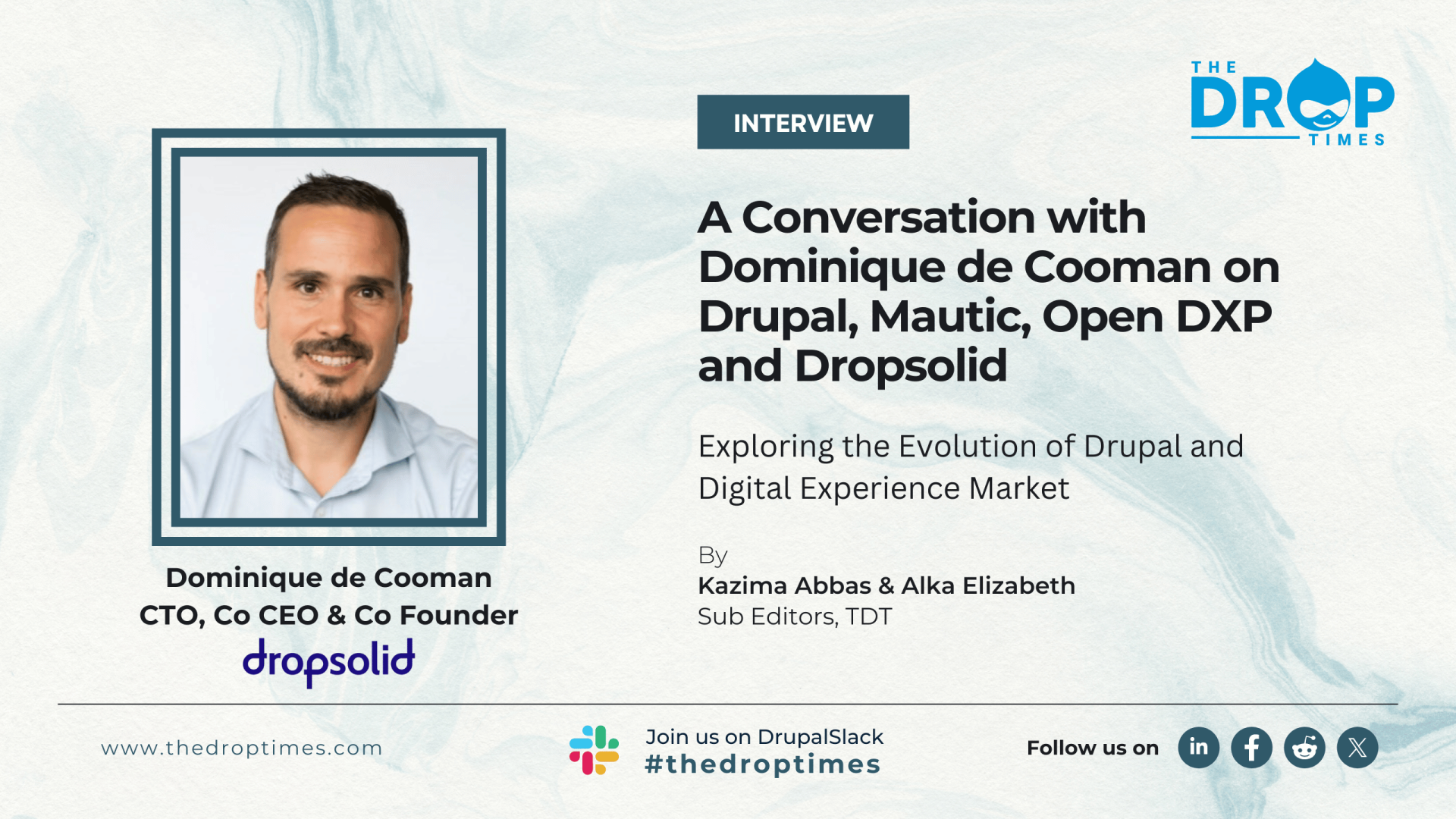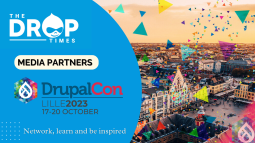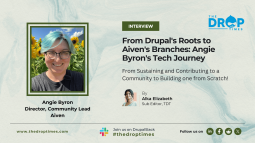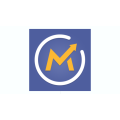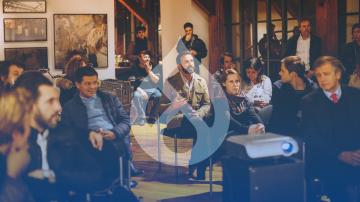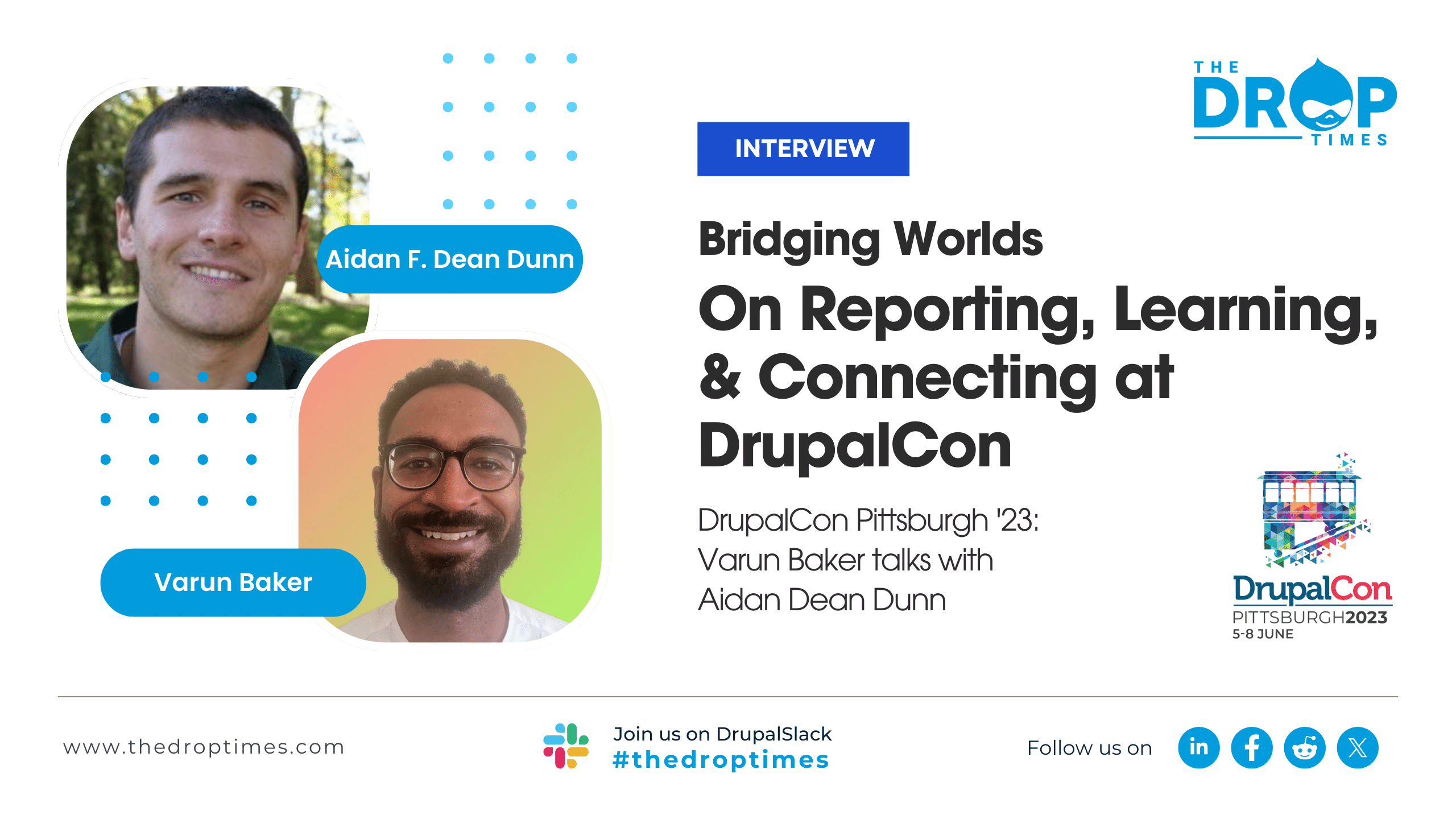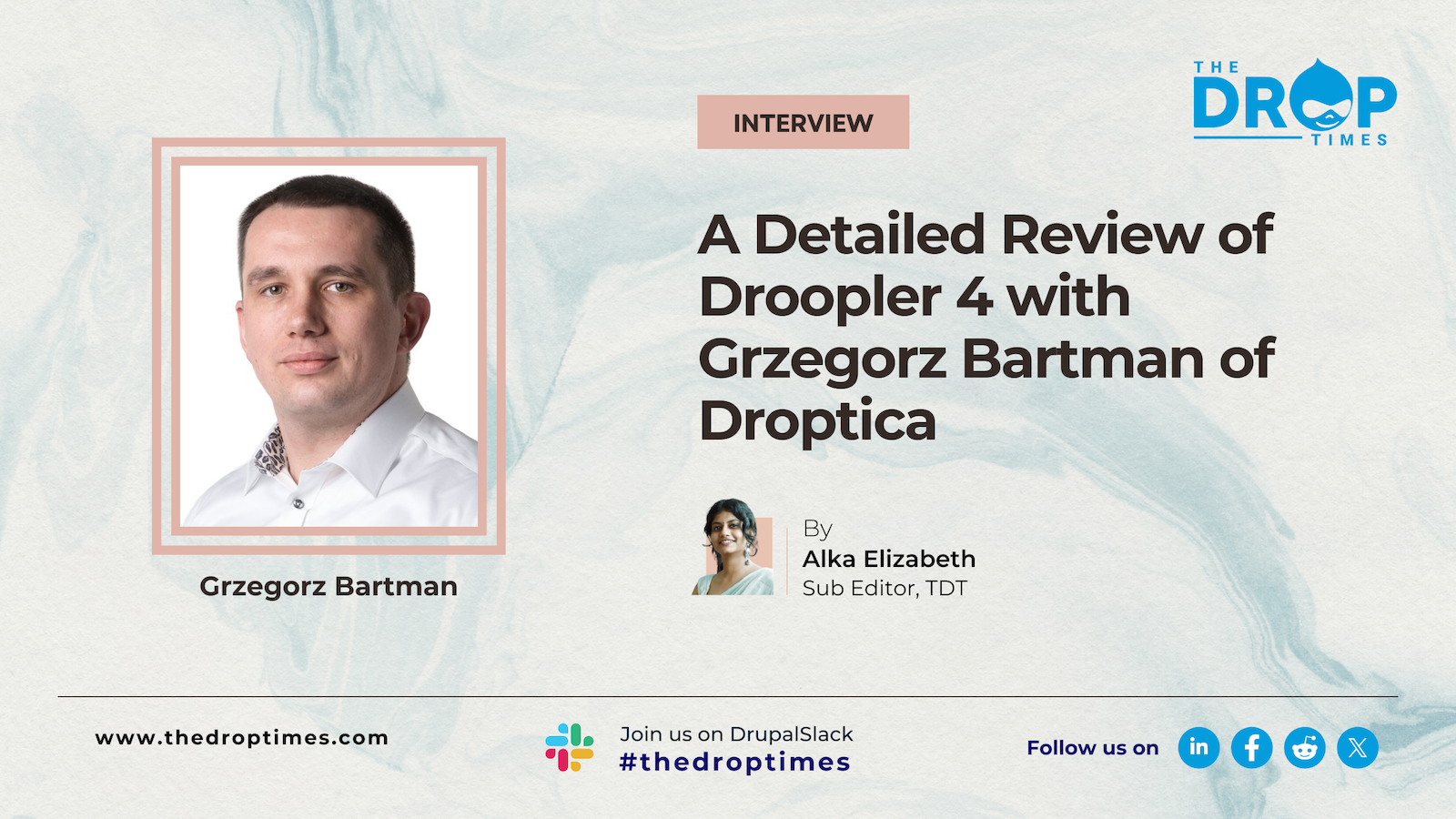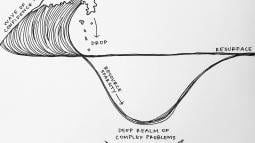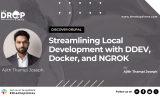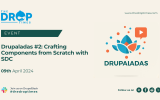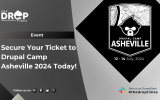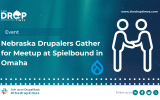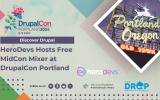A Conversation with Dominique de Cooman on Drupal, Mautic, Open DXP and Dropsolid
How can a company seamlessly merge digital agency services with Drupal integration while providing a leading Open Digital Experience Platform (DXP)? Dropsolid is precisely that company—a pioneering Digital Agency, a distinguished Drupal integrator, and a leading Open DXP provider encapsulated within a single entity. With a team of 70 digital experts, Dropsolid is dedicated to assisting companies, governments, and organizations to deliver exceptional digital experiences to diverse stakeholders.
Kazima Abbas, sub-editor of The Drop Times, recently framed a series of questions regarding the evolution of Dropsolid and Dominique de Cooman's significant contributions to Drupal. As the Founder, CTO & co-CEO at Dropsolid, Dominique is a seasoned open-source enthusiast, advocate, and pivotal figure in shaping digital experiences for companies, organizations, and governments. His insights into Mautic's reliance on community strength and his views on the present and future dynamics of Drupal are invaluable. Dominique graciously shared these insights via a Zoom Interview with Alka Elizabeth, sub-editor of The Drop Times.
[For those who prefer to watch the video instead of going through the text, we have uploaded it to YouTube, which is embedded towards the end of this conversation.]
In the interview, Dominique de Cooman shared his journey to founding Dropsolid, driven by his deep-rooted passion for Drupal and catalyzed by his transformative experience at DrupalCon Munich in 2012. Witnessing Drupal's monumental growth and the emergence of a vibrant community, Dominique felt compelled to establish a company that would break away from the conventional service-centric model and embrace a more product-driven approach.
At Dropsolid, Dominique emphasized their commitment to delivering an open DXP, where transparency and ownership are paramount. By offering an ecosystem built on open-source technologies like Drupal, Mautic, and Apache Unomi, Dropsolid empowers its clients to retain control over their digital experiences and data.
With that insightful backdrop, let's dive into the conversation with Dominique de Cooman and explore his perspectives on Dropsolid's journey, Drupal's evolution, and the future of open-source digital experiences.
TDT [1]: You've been involved with Drupal for quite an impressive period. What initially motivated you to get involved with Drupal, and what has kept you engaged with the platform over the years?
Dominique De Cooman: This dates back to 2007. I studied environmental sciences, marking a departure from my eventual path. Alongside this, I acquired skills in building HTML and CSS websites, likely for a school project. I learned C++ programming during my engineering classes, sparking my curiosity about website development. During my student years, this prompted late-night web searches to discover PHP and MySQL.
After completing my studies, I pursued a PHP course and secured an internship. Through a mutual connection, I met Thomas Bonte, a longstanding member of the Drupal community. Thomas sought assistance in migrating a significant PHP website to Drupal 5. I collaborated on the project, marking my inaugural venture into Drupal, involving a large-scale website.
This experience left a profound impression, showcasing Drupal's capacity to foster community and collaboration. Encouraged by community support, I pursued opportunities as a Drupal developer before transitioning to freelance work. Subsequently, I founded Dropsolid, marking the next chapter in my Drupal journey.
TDT [2]: Could you please elaborate on the journey that led you to establish Dropsolid? You began as a freelancer and Drupal developer, so what prompted you to transition into entrepreneurship and specifically found Dropsolid?
Dominique De Cooman: I was impressed with web development technology from the beginning, particularly how Drupal brought everything together. This drew me to Drupal.
Around 2012, an ex-colleague and I discussed starting a company, but it took us about 6 to 9 months to commit to it. My first DrupalCon experience in 2012, after being in the community for 5 years, ultimately inspired me to start the company. I attended DrupalCon in Munich, and I was truly impressed by the scale of the community at that time.
It was also during the peak of Drupal's growth, with the release of Drupal 7 and massive adoption. Drupal was experiencing tremendous growth, and many Drupal companies were expanding rapidly. Having worked for 5 years, I noticed that these companies were often stuck in repetitive cycles, merely charging customers for services. That led me to consider a more product-driven approach.
In essence, I pondered, what if we could encapsulate all the best practices from our projects into a cloud platform, products, and installation profiles? This idea later evolved into the vision of OpenDXP. I envisioned a company that could meet the demand centered around the same value creation process.
This notion was further reinforced at DrupalCon, where I encountered an individual who reminded me of Thomas, whom I met in 2007. Another person was Kubair Shirazee, who was very actively involved in the Drupal community in the past as well. He had a company in Pakistan called Ikonami, and he gave me the push. He said,
"You just have to do it. Just do it. See what happens."
Then I came back from DrupalCon Munich and called up Steven. I said,
"Steven, you know, I'm gonna do it. Are you in? I'm gonna do it anyway."
Dropsolid came about, but luckily, Steven said yes because I couldn't do what we were about to try alone. After all, we were still pretty young and naive.
We didn't know what kind of path we launched ourselves on. It took 10 years to reach the point where we are now, where we have the ingredients to fulfill our vision from the beginning, like being a product-driven service company. It took a couple of iterations, both on the services and on the products. Of course, the market matured during that time as well. But that was how I decided to start Dropsolid.
TDT [3]: Dropsolid is recognized as a digital experience provider, and the market comprises numerous such providers. What distinguishes Dropsolid from its competitors?
Dominique De Cooman: Very good question. What sets Dropsolid apart is that it delivers an open DXP to the market. All parts of the DXP are open, not only the CMS but also the marketing automation, based on Mautic, and personalization, based on Apache Unomi. The customer can own their platform, content, and data. It's not just open APIs where you can switch out different components.
You can own the components. And that guarantees our customers that they own the land on which they are building their product, but it's a tight balance. Many providers have been trying to put the concept of an open DXP in the market, but of course, you also need a business model that makes things viable. So, somewhere down the line, you have to charge for something. Dropsolid has an open DXP. You can see it as a cloud platform that brings together Drupal, Mautic, and Unomi. And we are working on other things.
For example, we're also working on making algorithms, machine learning algorithms, and open-source machine algorithms available so you can own them. It's not for every customer that the OpenDXP is relevant. Not every customer needs to own their applications, stack, data, and content. Many of them are quite content with paying a proprietary license, going along with that, and doing the integrations, and are very satisfied with just open APIs. However, many customers in the market are also exploring how they can incorporate this open marketing technology.
Because that's essentially what Mautic and Unomi are about. How can we integrate them into our products without shouldering the burden of acquiring all that knowledge? Can we enlist a platform company to strengthen our product and deliver digital experiences seamlessly integrating with enterprise infrastructure?
Dropsolid's business model is twofold. We position ourselves as a product-driven service company, offering openness to integration with customers' existing tech, allowing them ownership.
For instance, a noticeable trend in recent years, particularly in sensitive sectors like government, is the move towards self-hosted solutions. Innovative companies such as 37signals, creators of Basecamp, have shifted their cloud platforms to private data centers. This shift reflects a growing awareness of the importance of owning one's code and data.
Open-source marketing technology facilitates this ownership, empowering businesses to capture user behavior on their digital experience sites. With browsers like Chrome phasing out third-party cookies, the era of easily accessible data is fading. It's essential to recognize that obtaining data from platforms like Google and Facebook isn't free; it comes at a cost.
The era of cheap data is ending, prompting every company to consider data collection. Questions arise: Do you want to own it? How extensively do we want to pursue this endeavor? What vendors do we wish to engage with? How will we manage—on-premises, in the cloud, something in between? These aspects remain unclear, leading to significant business model innovation in the industry.
TDT [4]: What factors have prompted Dropsolid to transition from traditional Drupal projects to offering comprehensive OpenDXP solutions, and how does your product-driven approach and experience cloud platform cater to the changing demands of customers seeking integrated solutions for website, marketing automation, personalization, and AI?
Dominique De Cooman: Dropsolid is positioned in this evolving landscape. Traditionally, we generate revenue through projects—successful Drupal implementations and integrations—from small to large scale. Consultancy, training, and the typical Drupal agency model are also part of our revenue streams. Additionally, we earn from our cloud platform, where customers seek not only services but also packaged best practices, reflecting our commitment to product-driven solutions.
Because of all our projects over the years, they're becoming more complex. Customers aren't just asking for the CMS anymore. Drupal is a bike's frame—an excellent open DXP base. Customers want the entire bike—website, marketing automation, personalization, AI. They desire the full package, not just the frame. We can still deliver a custom frame, but market demand is shifting towards wanting the entire bike, albeit with options to customize. That's where the OpenDXP comes in, offering a comprehensive solution.
Customers want to ride their bikes this afternoon, not wait weeks. As a product-driven service company, we can offer a cloud platform starting from a higher level, built on best practices and with enterprise-grade infrastructure. This ensures they can hit the road sooner and with confidence.
With new projects, they can go live in weeks or months instead of dealing with more complicated integrations and going more custom. This is where the Dropsolid experience cloud helps give customers a head start. It's even more out of the box for smaller and medium enterprises with the installers.
Enterprises still need to integrate and build their Drupal sites. Strategy workshops are essential to determine the site's direction and appearance. As you move further into enterprise solutions, the out-of-the-box options decrease. However, it brings integrations with Mautic, Unomi, personalization, marketing automation, and best practices, educating customers on collaboration as multiple departments within the customer's organization work together.
This likely sets us apart from pure vendors who focus only on products and pure integrators who solely handle integration. By embodying both elements, we offer a unique proposition in both markets. In this niche, Dropsolid is well-suited for customers seeking exactly this and wanting to delve deeper into their stack with this open technology, becoming its owner.
TDT [5]: You mentioned that Dropsolid is involved in various projects ranging from small to complex. Could you share a few notable projects or clients that stand out in your experience with Dropsolid?
Dominique De Cooman: Historically, Dropsolid, due to its product-driven approach, has always aimed to support smaller companies. We sought to bring the power of Drupal to smaller companies, especially in the first five years of our existence. That was crucial. With Drupal 7, this endeavor was successful. However, when Drupal 8 was released and Drupal transitioned to enterprise-grade, we had to make a decision and somewhat shift our focus away from smaller companies. Here, I'm referring to SMBs, which are small and medium businesses.
For clarification, when I mention smaller companies, I'm referring to those with 5 to 50 employees. When I use the term "small and medium enterprises," I'm referring to companies with 50 to 100 people, up to several thousand people. On the other hand, when I mention "enterprise," I'm referring to companies with multiple thousands of employees.
If we consider turnovers, we would categorize companies as follows: small and medium businesses have turnovers ranging from 500k to 10,000,000; small and medium enterprises have turnovers from 10,000,000 to 500,000,000; and enterprises have turnovers exceeding 500,000,000.
As a company operating in these three sectors, we initially provided Drupal to small and medium businesses too, through the cloud platform.
When Drupal 8 was released, we realized Drupal was evolving into an enterprise platform. It was no longer economically viable to serve that segment, so we shifted our focus to the SME segment. Additionally, larger enterprises have become part of our clientele.
To illustrate, some of Dropsolid's largest customers include the German Agency of Work and the European Aviation Safety Agency (EASA), which are significant government bodies. In the small and medium enterprise segment, we serve clients such as the largest hospital in Belgium, the University Hospital of Antwerp, the National Government of Tourism, and the media branch of the Catholic Church in Belgium.
They require the DXP to communicate with their stakeholders because that's also a community. Therefore, OpenDXP is ideal for building communities with them. We still aim to provide our services and solutions for smaller and medium-sized businesses with ambition.
You start with an essential DXP. We still offer a product allowing customers to step in, where Drupal comes out of the box and is installed with Mautic on the cloud platform at a comparable price to HubSpot.
We continue to provide that service. I'm particularly excited about Mautic because it's driving great demand in ambitious SMBs and SMEs, especially at the organizational level. Many organizations are exploring open-source marketing automation because the HubSpot business model doesn't make much sense to them. They struggle to justify a business case where they must pay based on the number of contacts and then pass on that cost to their customers.
For instance, if you're a hospital with millions of patients to communicate with, acquiring a HubSpot license for such a large user base becomes impractical. The business case falls apart, as does the scenario for a library, for instance. This is where open marketing automation and open DXP solutions become sensible, enabling organizations to scale their communication efforts effectively.
Consider this: every library could have its Mautic instance centrally managed, or every cultural center and museum could have its DXP. The only feasible way to achieve this and deliver it efficiently is through scalability facilitated by a cloud platform. This is precisely what Dropsolid enables its customers to do.
In essence, we democratize marketing technology by offering it to enterprises and, through partners, to small organizations in packaged solutions.
This week, we launched the MAUTIC Free Trial. If you visit MAUTIC.org now, you can click the free trial and get a 14-day instance to test Mautic. This was a strategic initiative of the Mautic community for this year, which we are excited about. This week, we had a soft launch of Dropsolid, which was selected last year as the official trial provider.
The trial is provided on our cloud platform. We're bringing open-source marketing automation to the world, and I'm excited about it.
The revenue is shared with the community. For every instance that gets sold that goes to a paid tier, 40% of that revenue will flow back to the community. It will be a vital source of income for the community to hire more developers further, strengthening marketing automation.
There are many ideas in the Mautic community. In the Mautic community, I feel the same vibe as I felt in 2012 in Drupal.
TDT [6]: How did Dropsolid's experience at the conference in India highlighted the potential for open-source marketing automation in emerging markets like India?
Dominique De Cooman: You might say it was the size of your average European Drupal camp. However, there was a lot of excitement there. It was also excellent that it was organized in India because I believe open-source marketing automation could succeed significantly in countries like India.
I know you already see it in the adoption curve as well. Countries like Brazil and India are active in the (open-source) martech community. This makes sense because, in Europe and the United States, companies that don't (bother to be active) are in a position to charge license fees for proprietary marketing automation and DXP vendors to their customers, which are more like organizations.
You also see that on a business level in India because it doesn't make sense for them to pay the HubSpot licenses. It makes more sense to go with open source and be at a far lower price point. There, there is also the democratization of open-source marketing technology. And, yes, it was a good idea to organize Mautic exactly in India and get the Indian community really on board. They did a great job organizing the conference because organizing such an event is a lot of work.
I also felt positive vibes on the contribution day when we worked together. The day was divided into different groups, some focusing on product development while others worked on marketing and sales strategies. So, we laid some good groundwork, and I also got to know many people whom I'm still in contact with. I was impressed by India's size and the quality of its human resources. I shared this impression with others when I returned to Dropsolid.
I believe a positive trend is emerging. I see potential in the Indian market, so I anticipate forming many partnerships in India and with Dropsolid. We've planted some seeds that hold promise. Overall, it was a productive trip. During it, I listened to various ideas, including discussions about the future direction of Mautic, a responsibility I take seriously as a council member.
As you may know, Mautic transitioned into an independent nonprofit organization last year. Before that, Mautic was under the umbrella of a commercial organization after its acquisition by Acquia.
Last year, it was decided that the Mautic community would operate as an independent entity overseen by a board council referred to as the Mautic Council. This structure resembles the board of the Drupal Association but with added responsibility for council members. Each member actively contributes to the community's success rather than serving solely as an advisor.
Corporate support for the Mautic community from Acquia has shifted towards sponsorship, resulting in a significant decrease in financial support compared to the past. Previously, Acquia covered all expenses, but now, the community must generate revenue independently. This transition is a typical process for organizations in similar circumstances.
I think it's a good thing because the funding is not coming from one big corporate entity at the moment. It comes from several businesses and organizations, and the community is also incentivized to generate its revenue stream. That's also one of the reasons the free trials came to be: they generate a revenue stream and directly incentivize the community to deliver a product as well as they can because it will directly impact their revenue.
The better the product, the more revenue it will generate and the bigger the community. This is a product-driven approach, which I like. It puts the product central and then builds the community around it. I think it's important because if you do it the other way around, you risk becoming irrelevant. Or you risk becoming the agenda of a corporate entity determining where it should go.
So, the Mautic community has an absolute incentive to listen to customers and potential customers, define its ideal customers, and ensure that it delivers for those customers. One of the reasons I presented myself as a candidate for the Mautic Council was that I'm passionate about the idea of the OpenDXP.
While independent open-source platforms have strengths, there's also value in collaboration. At Dropsolid, we've demonstrated this by integrating Mautic and Drupal into a unified solution, offering customers a complete package rather than individual components.
By fostering such collaborations, we can enhance the adoption of not only Mautic and Drupal but also other open-source platforms. This approach of showcasing the value of unified solutions mirrors what proprietary platforms offer customers.
You hop on a bicycle. It just works. Everything seamlessly falls into place. You manage your content effortlessly, gather customer data smoothly, integrate various tools seamlessly, and build your business, organization, and community effortlessly. It's the perfect solution. This is exactly what proprietary vendors showcase to customers through their demos. As open-source competitors, we also need to demonstrate similar capabilities.
Customers are eager to know how our solution will benefit their business and streamline their operations. They're not just interested in technical details; they want to see tangible results quickly. Therefore, packaging these functionalities is paramount for us.
During the council elections, I stressed the significance of Mautic membership. To participate in the voting process, individuals must become Mautic members. Membership fees vary by region, with detailed information available on Mautic.org. This new membership system aligns with that of the Drupal community, which comprises approximately 2,400 paying members. For instance, individuals displaying a badge on their Drupal.org profile typically pay around $120 annually. Mautic has implemented similar membership structures.
40,000 websites are using Mautic. At the moment, there are 40 or 50 members who have just started. There is a lot of potential; many people are making money with Mautic. If you look at the built-with statistics, we can see that some big organizations are using Mautic as it is open source and are getting a lot of value from Mautic.
There's considerable potential for Mautic to expand its membership base. Many individuals are unaware that they can become individual members and exercise their voting rights. By becoming a member, one gains the opportunity to vote in future council elections, thereby influencing the project's direction.
This democratic process ensures that important questions are raised and addressed. As more users engage with Mautic and participate in these elections, we can better align with the community's needs and desires.
This aspect of Mautic's governance is truly distinctive. I don't know many open-source projects with such a consensus-based governance model.
TDT [7]: Do you believe that despite major sponsors stepping back, Mautic's reliance on its community strength has been beneficial? Considering recent developments such as the Mautic conference in India and various ongoing initiatives, do you see a positive change in Mautic's direction?
Dominque De Cooman: Yes, I believe so. Although meeting the budget is crucial, I'm confident we'll reach our goals. Additionally, while Acquia has scaled back its involvement, it remains a significant part of the ecosystem, with two members in the council and continued contributions. However, seeing other companies participating and diversifying the ecosystem is encouraging. This decentralization is positive in the long run, as it reduces central control and fosters a more open environment, aligning well with the principles of open-source projects.
Moreover, if Mautic can collaborate with other open-source initiatives to form the OpenDXP, it would contribute to a brighter future and create an open web that is accessible to everyone. This vision is shared across various communities, including Drupal, indicating a convergence of values and goals.
By aligning efforts, we can offer a compelling alternative to proprietary DXPs, which have seen considerable success. For instance, HubSpot boasts over 600,000 installations, as per the latest data from BuiltWith. Therefore, with collaborative efforts and a commitment to open principles, we can pave the way for a more inclusive and accessible digital landscape.
TDT [8]: Given your longstanding involvement in the Drupal community, how do you view the present and future of Drupal, both in terms of community dynamics and other aspects?
Dominique De Cooman: The future of Drupal is a complex question that has occupied my thoughts for the past few years. The number of Drupal installations is declining annually, particularly with Drupal 7's end-of-life status. While Dropsolid still offers support for Drupal 7, it's clear that many sites, especially in the SMB and SME segment, are migrating to alternative platforms.
One reason for this migration is the perception that Drupal has become heavily oriented towards the enterprise market. While Dropsolid has endeavored to make Drupal 8 accessible to lower-tier enterprises and SMBs, the business model poses challenges, with slim profit margins even at scale.
However, Drupal remains robust in the higher enterprise segment, where projects are substantial and treated with the same seriousness as CRM systems. While Dropsolid handles sizable implementations, companies are dealing with even larger projects. Thus, Drupal's strength persists in this realm, and far from crashing, its position may even strengthen over time.
Regarding installations, reversing the trend of smaller companies adopting Drupal appears increasingly challenging. The market, especially at the lower end, demands out-of-the-box solutions—they want the bike, not just the frame that allows for the best bike to be built. This trend poses a significant challenge to Drupal's adoption, and the only way to counter it is for Drupal to collaborate with other open-source ecosystems.
While Drupal continues to innovate, such as developing a better layout builder for page building, it faces formidable competition in the small and medium-sized enterprise sector. Competitors offer comprehensive solutions out of the box at competitive prices, making it difficult for Drupal to compete.
As for Drupal's adoption curve, while there are still around 300,000 Drupal 7 sites, the number of installations is declining. It's uncertain where this downward trend will plateau. While Drupal will likely remain relevant, particularly in the enterprise sector, its growth isn't comparable to platforms like Mautic, which experienced a significant increase in installations from 20,000 to 40,000 in just one year.
That narrative echoes Drupal's positioning from 2007 to 2015. Indeed, they are moving in the right direction—innovating and promoting Drupal as the premier platform for an open DXP. It's undoubtedly the most effective strategy they can pursue.
However, for Drupal to spur growth, it must evolve beyond merely the framework; it must embody the entire bicycle. Yet, the solution to achieving this remains elusive. Collaborating with other open-source platforms might hold the key to addressing this challenge.
TDT [9]: You have a session scheduled for Drupal Jam 2024 focusing on the integration of Drupal and Mautic into an open DXP. Could you please provide an overview of what attendees can expect from your session? This will give readers insight into what they can anticipate learning at Drupal Jam.
Dominique De Cooman: I submitted the session for Drupal Jam. Last year at Drupal Jam, I conducted a session on integrating Drupal and Mautic more closely. Throughout this year, I've presented this session multiple times at events like Mauticon Global, Drupalcamp Spain, Portugal, Davos, and DrupalCon Lille.
I've observed a notable shift in interest toward Mautic within the Drupal community. Initially, there wasn't much interest, but as the year progressed, more agency owners approached me, expressing a need to explore alternative ways of selling Drupal, particularly in the realm of OpenDXP. They wanted to know more about how we present this concept to the market.
During DrupalCon, this observation was further validated when I saw a presentation by Janne and Michelle addressing Drupal CEOs. They emphasized that the Drupal ecosystem was no longer growing organically and that companies needed to actively sell Drupal to clients. This marked a significant change from the past, where clients would seek out Drupal providers themselves.
The OpenDXP concept allows Drupal agencies to enter at a higher level, engaging with clients on a business level to create meaningful experiences for stakeholders. This shift enables agencies to make a stronger business case based on the value they can deliver through Drupal.
At this year's Drupal Jam, I aim to provide the community with an update on my experiences over the past year and how the market landscape has evolved. One key aspect I'll focus on is the importance of being part of the conversation with clients before they've made decisions about their technology needs.
Often, clients may not have determined how to address their needs or which technology to use. Therefore, engaging with them early on is crucial to influence their decision-making process. If they decide they need a DXP (Digital Experience Platform), you want Drupal to be their chosen solution.
During the session, I'll share anecdotes and insights, including the metaphor of the bicycle, frame, and wheels, to help agency owners reposition themselves in response to shifting market demands. My goal is to equip attendees with strategies to continue winning deals with Drupal in a changing business ecosystem—the Drupal community as a whole needs to adapt to these market shifts.
A shrinking business ecosystem could have negative implications for contribution levels, as many significant contributions come from sponsored efforts within the business sector. Therefore, by leveraging concepts like OpenDXP, agencies can enhance their competitiveness and contribute to the overall growth and sustainability of the Drupal ecosystem.
TDT [10]: Outside of your professional pursuits, what activities or hobbies do you enjoy? Is there a particular passion or interest that you like to pursue in your free time?
Dominique De Cooman: On a personal note, I enjoy spending time with my family—a wife and a three-year-old child. Additionally, I dedicate a significant amount of time to meditation. This practice helps me stay connected and maintain balance amidst my other activities.
Since moving to Portugal, I've had more opportunities to engage in these activities. I also enjoy skateboarding here. These aspects and my work for the Mautic community and DropSolid fill my days and weekends.
Related Event Sessions
Disclaimer: The information provided about the interviewee has been gathered from publicly available resources. The responsibility for the responses shared in the interview solely rests with the featured individual.
Note: The vision of this web portal is to help promote news and stories around the Drupal community and promote and celebrate the people and organizations in the community. We strive to create and distribute our content based on these content policy. If you see any omission/variation on this please let us know in the comments below and we will try to address the issue as best we can.




